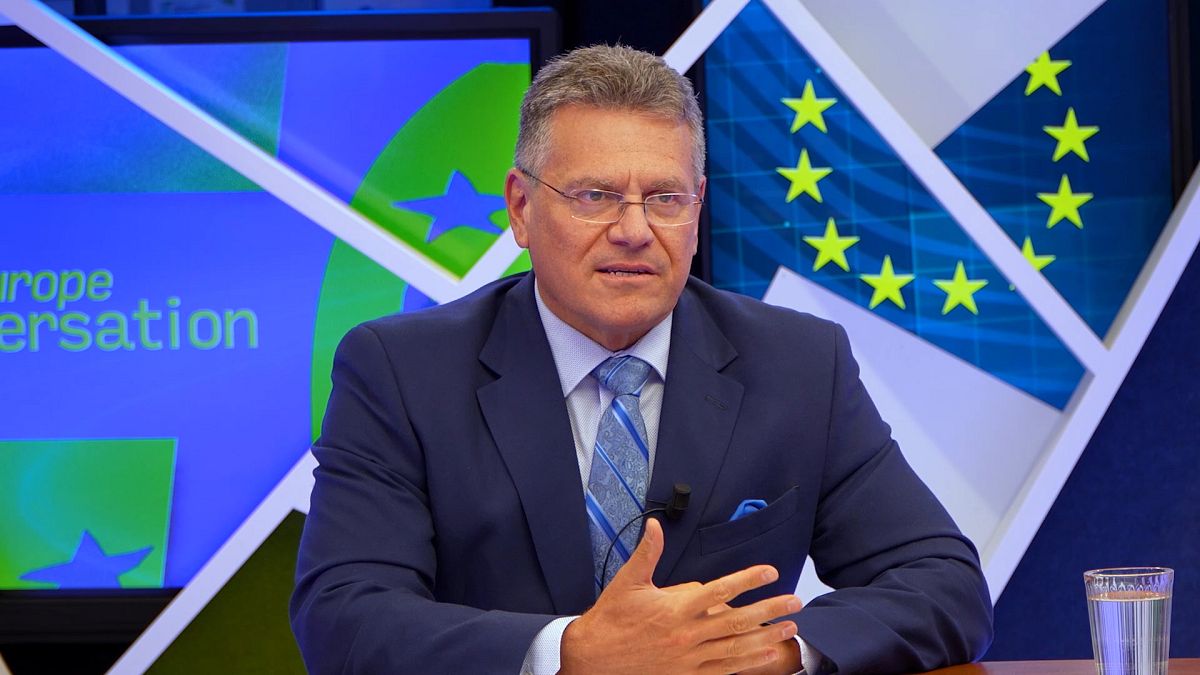The EU Trade Commissioner Maros Šefčovič says he hopes the British public have a pragmatic view of the recent EU-UK deal covering trade, defence and fishing.
The first ever EU-UK summit was “an important step forward” in repairing relations between the two sides after almost of a decade of bitterness and mistrust following the referendum which saw the UK withdraw from the EU in 2020.
“I think we really made a very important step forward and we are opening the new chapter in EU-UK co-relations”, Šefčovič told The Europe Conversation.
“We are eternal neighbours, we are the biggest trading partners”, he said.
Despite the warm words and practical nature of the deal, reaction from pro-Brexit politicians and newspaper columnists was one of outrage, accusing the Labour government of “surrender” to Brussels.
The deal opens up discussions for the UK to sign up to equal SPS (Sanitary and Phytosanitary) standards, EU regulations relating to human, animal and plant life from risks like diseases and pests and carcinogens.
When complete, it means the farming and fishing industries will no longer have the burden of extensive paperwork required to the enter the EU marketplace similar to the arrangement before the UK left the Single Market.
The UK will adhere to EU standards – which the vast majority of production lines in the UK maintained since leaving the EU – but they will have full access to closest trade partners. Approximately 42% of UK trade goes to the EU.
The deal also includes provisions to eventually allow young citizens of the EU and UK limited travel visa-free.
In addition, UK travellers will soon be able to use E-Gates at EU airports meaning tourists won’t have to wait in line to have their passports stamped.
A key element to this, was also a Security and Defence partnership to bolster European security given the geopolitical instability facing the continent.
Tory leader Kemi Badenoch said she would reverse the deal if she comes into power after the next general election, due to take place sometime in 2029.
However, Šefčovič says he hopes the British public will appreciate the “practical results and practical implementation of the agreements”, he told Euronews.
“If you want to restore the bridge building among the young people, and between the EU and the UK if we want to make it easier for the farmers, for the fishers through the SPS agreement and if you want to make it even better for the people from Northern Ireland, I think these are all very important decisions,” he said.
A new deal with the US
Meanwhile, in relation to the ongoing negotiations with the US over trade tariffs, Šefčovič indicated it’s unlikely he’ll settle for an arrangement which involves a widespread tariff base, similar to what the UK recently agreed.
Goods coming from the UK will be subjected to a tariff baseline of 10%, but aluminium and steel tariffs of 25% have been removed as part of that deal.
EU member states have stated they would be against any similar settlement, noting the size and heft of the EU’s Single Market as an equal competitor to the US market.
“A very clear message I got from our trade ministers was that they insist on having a balance deal with the US. So of course we are ready to negotiate with our American partners,” he said.
“We are pushing for a balanced deal.”
The US imposed 25% tariffs on EU cars, steel and aluminium and 20% on other goods last April. But then halved the 20% rate for a 90-day period to negotiate a new agreement.
